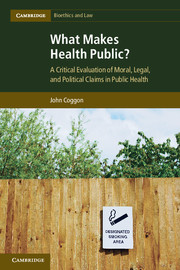 What Makes Health Public?
What Makes Health Public? Published online by Cambridge University Press: 05 June 2012
Introduction to Part I
The conceptual framing and critical analysis undertaken throughout this book are directed to investigating normative claims made in relation to public health. My central argument is that the meaningful studies that would apply practical philosophy to this are in politics. They should be informed by works from disciplines including moral philosophy, law, economics, and sociology, but the interesting and important health-related responsibilities – of States, private companies, and individuals – are political. Ideological differences, concerns for competing goods, and distinct forms of partiality at the base of disputes in political theory are therefore the relevant sources of contention. And it is in answers to these disputes that questions on public health are meaningfully answered. Some might suggest that this book should have explored the question “What makes health private?”; they might argue that I beg the question and presume a ‘liberal bias’. Others might contend that I beg the question by presuming that health could even be a public matter. In what follows I seek to vindicate my analysis against such accusations. In brief, I contend that it is wrong to take it that everything relating to health can just be either ‘private’ or ‘public’. I also argue that most theorists agree with this, and that all policy-makers do. However, our reasons for doing so differ. Thus my analysis lends itself to various important tasks. The first of these is to provide a conceptual and analytic ‘groundwork’ to understand the nature and scope of arguments in public health ethics and law. This is the purpose of Part I of the book.
To save this book to your Kindle, first ensure no-reply@cambridge.org is added to your Approved Personal Document E-mail List under your Personal Document Settings on the Manage Your Content and Devices page of your Amazon account. Then enter the ‘name’ part of your Kindle email address below. Find out more about saving to your Kindle.
Note you can select to save to either the @free.kindle.com or @kindle.com variations. ‘@free.kindle.com’ emails are free but can only be saved to your device when it is connected to wi-fi. ‘@kindle.com’ emails can be delivered even when you are not connected to wi-fi, but note that service fees apply.
Find out more about the Kindle Personal Document Service.
To save content items to your account, please confirm that you agree to abide by our usage policies. If this is the first time you use this feature, you will be asked to authorise Cambridge Core to connect with your account. Find out more about saving content to Dropbox.
To save content items to your account, please confirm that you agree to abide by our usage policies. If this is the first time you use this feature, you will be asked to authorise Cambridge Core to connect with your account. Find out more about saving content to Google Drive.